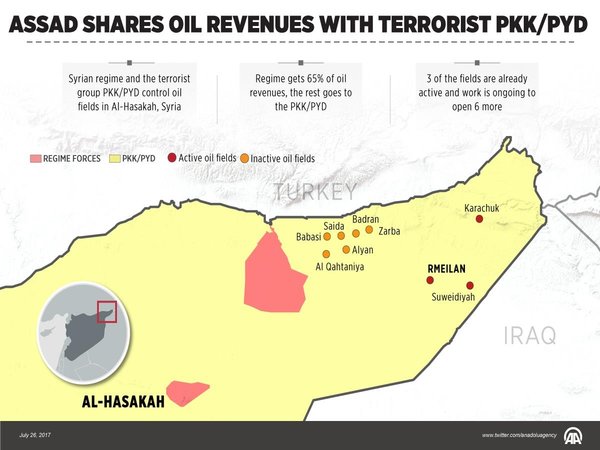PKK/PYD, the Syrian offshoot of the terrorist organization PKK and Bashar al-Assad's regime control the oil fields in the northeastern Syrian province of Al-Hasakah, the revenue from which they share from these fields, local sources told Anadolu Agency on Wednesday.
PKK/PYD is in control of Al-Hasakah in the east, northern Raqqah, Manbij, to the east of Aleppo, Afrin and the Tal Rifaat districts.
PKK/PYD and the Assad regime together controls nine oil fields in the Al-Hasakah province, three of which are currently active and 6 are inactive, according to local sources.

The PKK, listed as a terrorist organization by Turkey, the U.S., and the EU, has waged a terror campaign against Turkey for more than 30 years, during which more than 40,000 people have been killed. It is also involved in illicit drug production, manufacture, and trafficking.
Approximately 30-35 thousand barrels of oil per day is produced from nearly 350 small oil wells located in the war-torn country's southwestern As-Suwayda city, the oil rich city of Rimelan and Karacok in northeast Syria.
Recently, the PKK/PYD handed over the control of oil production in the Rimelan region to the Assad regime and a revenue sharing agreement was signed between the sides.
According to the agreement, the Assad regime will earn 65 percent of the revenue while the PKK/PYD will obtain 20 percent. The PKK/PYD gives the remaining revenue to local Arab forces that are responsible for the protection of the fields. The Assad regime supplies salaries of the guards and other workers.
Despite the agreement, the PKK/PYD still keeps an office in the Rimelan region where their officers provide reports on oil production to the organization.
The oil that is produced from these fields is transported to refineries in Syrian regime-held Homs via trucks. Entrepeneur Husam Katirci, a close associate of the Assad family, oversees the oil transfer.
Oil produced from Al-Hasakah is targeted for Iraq's Sinjar district.
Prior to the current conflict, when Syria produced 383,000 barrels per day (b/d) of oil and 316 million cubic feet per day of natural gas, Syria's oil and gas sector accounted for approximately one fourth of the government's revenues, according the country analysis of the U.S. Energy Information Administration (EIA).
Syria's oil production, which averaged over 400,000 b/d between 2008 and 2010, was less than 25,000 b/d in May 2015, the EIA says.